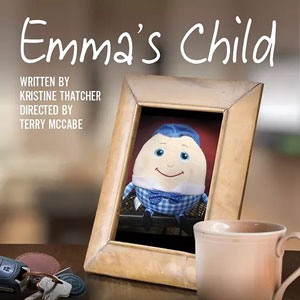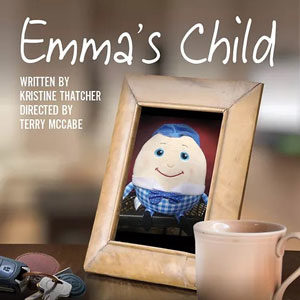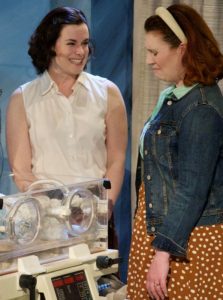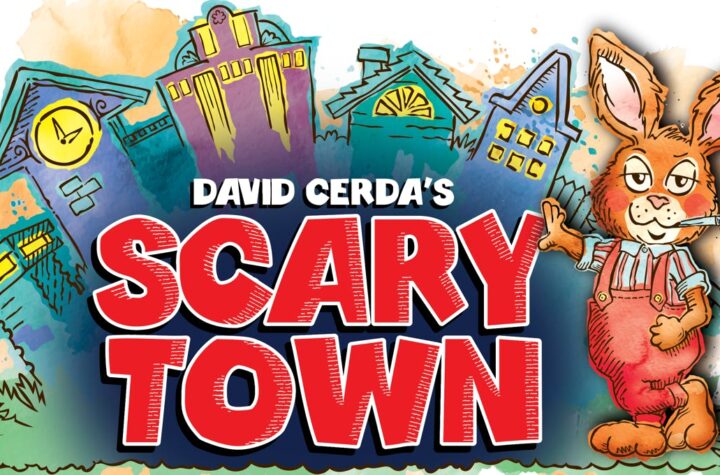
 [rating=4]“Emma’s Child”, written by Kristine Thatcher and directed by Terry McCabe, is a heartfelt drama about what it means to want to adopt an infant with severe physical disabilities. After Jean Farrell (Kat Evans) could not get pregnant for sixteen years, she and her husband Henry (James Sparling) decide to adopt a child, but the couple has very different expectations for the infant. Each has a distinct idea of what family means, what parenthood means, and what having a child with a disability means—and their opinions don’t necessarily mesh with each other. And each of them has differing needs for fulfilment when it comes to family life.
[rating=4]“Emma’s Child”, written by Kristine Thatcher and directed by Terry McCabe, is a heartfelt drama about what it means to want to adopt an infant with severe physical disabilities. After Jean Farrell (Kat Evans) could not get pregnant for sixteen years, she and her husband Henry (James Sparling) decide to adopt a child, but the couple has very different expectations for the infant. Each has a distinct idea of what family means, what parenthood means, and what having a child with a disability means—and their opinions don’t necessarily mesh with each other. And each of them has differing needs for fulfilment when it comes to family life.
A pregnant teenager Emma (Katie MacLauchlan) gives birth to Robin, a premature baby boy. From the onset, he has been in intensive care, hooked onto various tubes and an IV. Yet Emma is somewhat in a state of denial and believes that the baby was perfectly healthy at birth, and that is the infant who she wants to hand over to adoptive mother Jean. During the course of the show, we watch how Jean bonds with this little baby. The infant’s presence is clearly made analogous to Humpty Dumpty (a photo of which makes its way to the cover of the playbill). We all know how the nursery rhyme ends. And in describing his wife’s love for a child who he believes is suffering and is about to die soon, Henry says, “And I have to pick up the pieces.” But so many characters have lives that have been broken because of this profoundly disabled infant: from the birth mother to the attendants caring for the child. And what about the child’s perspective towards all of this? Henry believes that the infant is constrained by his inability to tell anyone whether he is in pain; plus, unlike an adult, he is not in any position to give consent for or against using extraordinary means for his survival. There is a constant tension throughout between having a child tugging at your heartstrings and believing in scientific rationalism, with its grim reality that Robin can never become a “normal” human being. He will never be able to play normally as a child or run or crawl; he will never be able to accomplish the basic tasks of living as an adult. He will always have to be cared for at some level and will never be able to raise a family of his own.
Later on, Robin is eventually to be transferred from the neonatal unit at Christ Hospital to a facility run by Misericordia in the suburb of Harvey, Illinois. But Jean has already bonded with the baby. Of course, she wants the child to come home with her so that she could take care of it. But the doctor, the attendants, and the hospital administrator feel very differently. It is evident that the baby will always have special needs, regardless of where it is placed and who ultimately cares for it. And what might Robin’s quality of life be? It is clear that the prospect of Jean’s wanting to adopt this child has already affected the couple’s marriage and possible relationships with relatives and friends. These ideas and more are fleshed out throughout this two-hour performance, which also stars Jamie Black, MiKayla Boyd, Andrea Conway-Diaz, marssie Mencotti, Rebecca Sparks, Lee Wichman, and Maria Zoia.
The setting is mostly inside the neonatal facility at Christ Hospital, in Oak Lawn, Illinois, as well as at the Farrell’s home in Rogers Park, Chicago, during 1990-91. The guest who I took with me to the show was a social worker and educator with an expertise in the area of disabilities. Her lingering question was relatively trivial regarding the substance of the story but nevertheless an important professional concern, that is, whether there was indeed a skilled nursing facility run by Misericordia in Harvey, Illinois, in 1991. And if so, she wondered whether that facility would have been in a position—financial, medical, or otherwise—to accept a special needs infant who was a ward of the State.
with an expertise in the area of disabilities. Her lingering question was relatively trivial regarding the substance of the story but nevertheless an important professional concern, that is, whether there was indeed a skilled nursing facility run by Misericordia in Harvey, Illinois, in 1991. And if so, she wondered whether that facility would have been in a position—financial, medical, or otherwise—to accept a special needs infant who was a ward of the State.
The only real issue I had with the play was that there are a few too many “throw-away lines”, generally having to do with several subplots that divert our attention from the main focus. Do we really need to know all the details between Emma and the infant’s father? Do we really need to know that Jean’s friend Fran is having an affair with Scott and is cheating on her husband Sam? These subplots distract us just enough that our collective minds begin to wander, because we cannot absorb it all—nor do we need to do so to understand what is going on. That said, the acting is great throughout, and many of the characters are so well-developed that you can feel for all of them.
“Emma’s Child” was originally performed in 1996 at the Victory Gardens Theatre, also under Terry McCabe’s skillful directing. Today at City Lit, he wonderfully moves the action along from one scene to the next and onto various levels of a very small stage. Considering the confines of the venue, Samantha Gribben’s set design is nicely done in conjunction with Benjamin Dionysus’s lighting and sound design. The sound of the music box is especially poignant in telling the tale. Props designed by Jeff Brain are more than adequate for the task. Louise “Scout” Gregory’s costumes are well suited for the time and place.
Raising a child with profound disabilities is ultimately a family matter, and different families have to make important decisions of what works—or doesn’t work—for them in dealing with the education, health concerns, and socialization of a child, not to mention the emotional and financial costs. The love of a parent or loving couple can often overcome the stress in taking on this very difficult task alone, but it can potentially cause marital strain. Hence, the assistance of trained nurses and a specialized facility may be the answer. In this story, when the biological parent is absent from the equation and the child has no family, the question is ultimately who makes these decisions about a child’s care and treatment. Who is “qualified” to act on behalf of the child’s best interest? Is it the medical personnel? Is it the State? Is it the soon-to-be adoptive parents? What about the biological family member (in this case, a grandmother) who has not (yet) given up custody? This deep tragedy gives us a lot to unpack in areas as diverse as family relations, public policy, and mental health. In all, this production can provide us with a lot of food for thought.
“Emma’s Child” is running through May 29, 2022, at the City Lit Theatre, on the second floor of the Edgewater Presbyterian Church, 1020 W. Bryn Mawr Avenue, Chicago.
Ticket prices are $34 for adults; $29 for seniors; and $12 for students.
Note that buying a three-show subscription (valid for any performance) will reduce the price of attending any one show separately.
Information and tickets can be found at https://www.citylit.org/. Alternatively, you may call the box office at 773-293-3682 or email them at boxoffice@citylit.org.
 Performance schedule:
Performance schedule:
Fridays and Saturdays at 7:30 p.m.
Sundays at 3:00 p.m.
Plus two Monday performances on May 16 and May 23, both at 7:30 p.m.
For more information, go to https://www.citylit.org/thirteen-days.
Proof of vaccination and a matching ID will be necessary on entry to the facility. Masks must be worn at all times in the theatre. The City Lit Theatre Company will be following all CDC guidelines and will comply with the full set of municipal guidelines in place at any time.
To see what others are saying, visit www.theatreinchicago.com, go to Review Round-Up and click at “Emma’s Child”.






More Stories
“Henry Johnson”
“Scary Town” reviewed by Frank Meccia
“Translations”